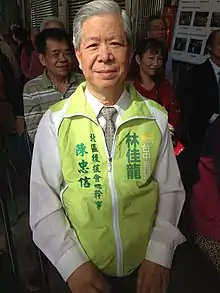Chen Chung-hsin
Chen Chung-hsin (Chinese: 陳忠信; Pe̍h-ōe-jī: Tân Tiong-sìn; born 15 April 1949) is a Taiwanese journalist, editor, and politician.
Chen Chung-hsin | |
|---|---|
| 陳忠信 | |
 Chen Chung-hsin campaigning for Lin Chia-lung in November 2014 | |
| Acting Secretary-General of National Security Council of the Republic of China | |
| In office 27 March 2008 – 20 May 2008 | |
| Preceded by | Chiou I-jen |
| Succeeded by | Su Chi |
| Member of the Legislative Yuan | |
| In office 1 February 1999 – 31 May 2004 | |
| Constituency | Republic of China |
| Succeeded by | Su Chia-fu |
| Personal details | |
| Born | 15 April 1949 |
| Nationality | Republic of China |
| Political party | Democratic Progressive Party |
| Alma mater | Tunghai University |
| Occupation | politician |
| Profession | journalist |
Chen studied mathematics at Tunghai University and began his career in journalism, serving as a writer for the Independence Daily Post for eight years, as well as editor of Formosa Magazine and Taiwan Social Research Quarterly.[1][2] Chen adopted the pen name Hangzhi (杭之).[3] His association with the tangwai-affiliated Formosa Magazine forced him to go on the run in the aftermath of the Kaohsiung Incident.[3][4]
Chen was twice elected to the Legislative Yuan via party list proportional representation as a member of the Democratic Progressive Party.[1][2] As a legislator, Chen jointly proposed an amendment to the Criminal Prosecution Law in October 2000, alongside Chiu Tai-san and Lee Ching-hsiung, regarding the use of search warrants.[5] In February 2002, Chen attended a press conference with You Ching and Chen Sheng-hung, in support of Lin Chin-hsing's opposition to a proposed increase for National Health Insurance premiums.[6] During his legislative tenure, Chen was a member of the defense committee.[7]
While serving as a legislator, Chen was appointed head of the Democratic Progressive Party's Chinese Affairs Department in July 2002.[8] Compared to senior DPP leaders at the time, Chen's views on Cross-Strait relations were considered more favorable to China.[8] The next month, Chen Chung-hsin reiterated the Chen Shui-bian presidential administration's adherence to the Four Noes and One Without.[9][10] Chen Chung-hsin had planned to commemorate the National Day of the Republic of China in Hong Kong, but turned his visa application in late and was unable to participate.[11] In January 2003, he visited China for the first time since taking on his party position.[12][13] In December of that year, Chen discussed Kuomintang chairman Lien Chan's endorsement of Chen Shui-bian's One Country on Each Side, stating that Lien had previously criticized the concept and called on Lien to explain his party's views on Cross-Strait ties.[14] In April 2004, Chen Chung-hsin was considered a candidate to replace Tsai Ing-wen as head of the Mainland Affairs Council.[15] The position went to Joseph Wu, and Chen instead became deputy and acting secretary-general of the National Security Council.[16][17] After leaving public service, Chen has commented on aspects of Taiwanese identity,[18] Ma Ying-jeou's actions regarding Cross-Strait relations,[19] and Taiwan's place within the one China principle.[20]
References
- "Chen Chung-hsin (4)". Legislative Yuan. Retrieved 17 May 2022.
- "Chen Chung-hsin (5)". Legislative Yuan. Retrieved 17 May 2022.
- 杭之 (16 December 2020). "寄給林毓生教授的信攤在我眼前 那是《一九八四》的情景—杭之口述歷史之三" (in Chinese). Up Media. Retrieved 17 May 2022.
- Lee, Shao-feng (10 December 2003). "Lessons from the Kaohsiung Incident". Taipei Times. Retrieved 17 May 2022.
- Low, Stephanie (7 October 2000). "Reforms sought on issuance of search warrants". Taipei Times. Retrieved 17 May 2022.
- Ko, Shu-ling (23 February 2002). "Health-fee plan sickens DPP lawmakers". Taipei Times. Retrieved 17 May 2022.
- Hsu, Stacy (6 April 2004). "Blue-camp poseur should be punished, DPP legislators say". Taipei Times. Retrieved 17 May 2022.
- Ko, Shu-ling (21 July 2002). "DPP appointee sees little change to China policy". Taipei Times. Retrieved 17 May 2022.
- Lin, Mei-chun (6 August 2002). "DPP clarifies position, sticks to 'five no's'". Taipei Times. Retrieved 17 May 2022.
- Lin, Mei-chun (2 August 2002). "DPP regrets Beijing's response to Chen's remarks". Taipei Times. Retrieved 17 May 2022.
- Lin, Miao-jung (9 October 2002). "Visa snags delay DPP lawmakers". Taipei Times. Retrieved 17 May 2022.
- Lin, Mei-chun (21 January 2003). "DPP official visits Beijing". Taipei Times. Retrieved 17 May 2022.
- Lin, Miao-jung (24 January 2003). "Academics urge MAC to promote economic links". Taipei Times. Retrieved 17 May 2022.
- Ko, Shu-ling (22 December 2003). "Chen adds Mongolia to strait debate". Taipei Times. Retrieved 17 May 2022.
- Chen, Melody (30 April 2004). "Chen explains secret US visit". Taipei Times. Retrieved 17 May 2022.
- Lin, Chieh-yu (12 May 2004). "Su Tseng-chang to take Presidential Office reins". Taipei Times. Retrieved 17 May 2022.
- "Chen names transition team to prepare for Ma". Taipei Times. 30 March 2008. Retrieved 17 May 2022.
- Ko, Shu-ling (10 October 2010). "Taiwanese pride suffers under Ma: poll". Taipei Times. Retrieved 17 May 2022.
- Ko, Shu-ling (28 June 2010). "ANALYSIS : Taipei not ready for talks with Beijing". Taipei Times. Retrieved 17 May 2022.
- "DPP is duty-bound to establish official communications with China: Su Chi". Taipei Times. 27 September 2017. Retrieved 17 May 2022.